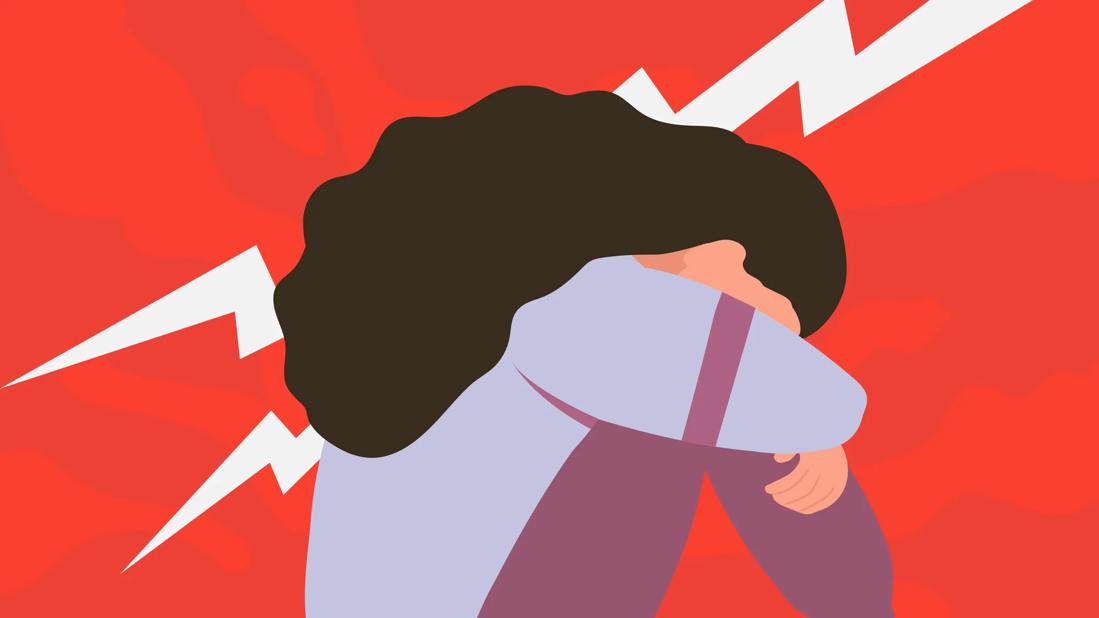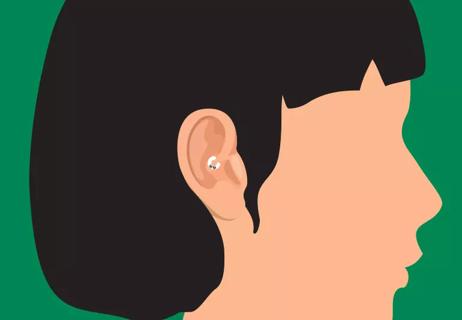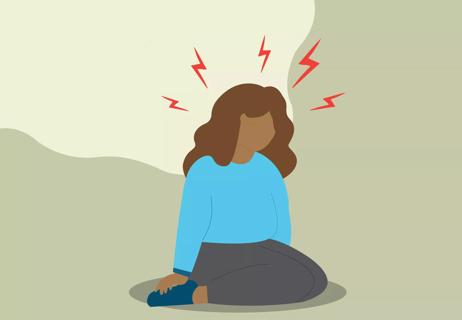Start by reevaluating your triggers and lifestyle factors, but also consider trying new medication

A migraine is more than just a headache. If you’ve had one (or many), you know that symptoms like pain, trouble concentrating, fatigue, nausea and vomiting can disrupt your daily life.
Advertisement
Cleveland Clinic is a non-profit academic medical center. Advertising on our site helps support our mission. We do not endorse non-Cleveland Clinic products or services. Policy
And if you have chronic migraines, figuring out how to manage or stop them can be just as frustrating as the headache itself.
“People with chronic migraines have at least 15 headache days per month or more,” explains neurologist Payal Soni, MD, “So at least half the month or more with headaches.”
You’ve tried medication, you’ve made lifestyle changes, you avoid your triggers and you’ve even tried alternative methods like acupuncture or biofeedback — but nothing seems to stop the migraine train from steamrolling over your life.
Now what?
Dr. Soni discusses the importance of talking to a healthcare provider about your migraines and what you can do when it feels like nothing is helping them.
While there isn’t a cure for migraines, there are plenty of treatment options available. But it might take some guesswork to find a treatment or medication that works best for you.
“For the majority of people, we do need to go through a process to find what works,” notes Dr. Soni. “That’s true for pain management in general. We don’t have a way to predict how you will respond to certain medicine, so sometimes, it does take a little bit of a trial-and-error process to find the medicine that is most effective and best tolerated.”
Advertisement
And it’s important that you really talk to your healthcare provider about how you’re feeling — beyond just constantly having a headache. Information like headache frequency, triggers and associated symptoms — like sleep problems, anxiety or depression — can help your doctor in their diagnosis and treatment plan.
“Some of the medicines that we use can sometimes be used for a dual indication,” explains Dr. Soni. “There are some anxiety medicines that can also be used to treat migraine. So, if we’re also trying to treat anxiety, we may be able to use something like that.”
We know that when you start a new medication, it can be frustrating if it doesn’t work right away or if you experience side effects. But try to give it some time, she adds.
“The majority of the oral medications for migraines can take some time to start working, which is unfortunate,” she continues. “I recommend at least a six- to eight-week trial of a medication. And if you can tolerate it, the appropriate trial period is considered three months.”
It can feel like you’re shouting into the void about how often you have migraines and how much the debilitating pain affects your day-to-day life. Is anyone listening?
If you haven’t spoken to a healthcare provider, it’s time to do so. And if you’ve been working with your primary care provider or a neurologist, let them know the difficulties you’re having.
“You may have had headaches for years but haven’t really seen a healthcare provider. You may think your headaches are normal or that it’s not a big deal,” relates Dr. Soni. “Or you may not want to talk to your primary care provider about it because you don’t think that there’s anything to be done.”
In fact, research shows that many people tend to underreport how many headaches they have a month.
“One of the biggest reasons why people underreport may be because of the way the question is asked by a healthcare provider,” says Dr. Soni. “For example, a provider may ask, ‘How many migraine days do you have?’ So, the person only considers their most severe headaches as migraine and they may not count any milder or lower-level headaches.”
Dr. Soni says she prefers to ask: “How many days out of the month do you have some level of headache whether it’s mild, moderate or severe?”
And she stresses how important is to speak up for yourself.
“You need to be an advocate for yourself, so if you’re struggling or suffering, bring it up to your family doctor or ask for a referral to a neurologist or a headache specialist,” she recommends.
Advertisement
Here’s what else you can do to get back on the right track with managing your chronic migraines:
“When we’re at a point where you have a headache that’s not going away at all or your headaches are occurring more frequently, we want to backtrack a bit and go back to reevaluating any potential triggers and taking a closer look at your lifestyle,” explains Dr. Soni. “Lifestyle factors like sleep, diet, exercise and mood can get put on the backburner.”
It bears repeating how important certain lifestyle factors can be to managing chronic migraines.
“Even with the best medications, if you’re not sleeping well, or you have anxiety that’s not well-controlled it can still contribute to your overall headache burden,” says Dr. Soni. “We want to see if there’s other aspects in your lifestyle that need to be addressed or tweaked. And this can often help with chronic migraines.”
If you’ve been on a medication for a few years and still aren’t seeing any real relief, consider talking to your healthcare provider about some of the newer options available to treat chronic migraines.
Over the course of the last few years, there have been advancements in chronic migraine medication.
“This has been really exciting because this is the first time that we’ve had a class of medicine that is specifically developed for migraines,” enthuses Dr. Soni. “Prior to this, we used medicines that were for anxiety, blood pressure and seizure medicines, which came with their own host of side effects; whereas these medicines are specific for migraine.”
Advertisement
She’s talking about a completely new class of medicine called calcitonin gene-related (CGRP) monoclonal antibodies.
“These are medicines that work on the CGRP molecule,” says Dr. Soni. “CGRP is an inflammatory molecule that’s elevated in people who have migraines, and these medicines work to reduce its action.”
CGRP monoclonal antibodies currently come as a daily oral medication, a once-a-month self-administered injection and an in-office infusion that’s given every three months.
“Then, the newest one is a nasal spray that’s used as a migraine rescue medication,” she continues. “So, when you do have a bad headache, this is something that you can use to help relieve the pain in that moment.”
While you may need a preventive medication (one you take every day regardless of if you have a migraine), as well as a rescue medication (one that you take when you have migraine), you may be searching for other ways to manage your chronic migraines.
Dr. Soni says certain alternative therapies can be helpful in migraine management — especially if you’re sensitive to certain medications or prefer not to take them. Options can include cognitive behavioral therapy, biofeedback and even acupuncture.
“With acupuncture, there aren’t too many large-scale studies that prove its beneficial,” notes Dr. Soni. “But there have been smaller studies that have shown that it can be helpful and can be a helpful adjunct to the overall treatment plan.”
Advertisement
She also recommends adding certain supplements to your routine.
“There are also certain supplements that you can add that have been studied and shown to have some evidence of reducing migraine frequency,” says Dr. Soni. “Those include supplements like magnesium, vitamin B2 and coenzyme Q10.”
Overall, it’s possible to find the right treatment for your chronic migraines. Consider looking at your life holistically: Do you need to tweak your medication? Are you really avoiding your migraine triggers? How else can you reduce stress and anxiety?
And a key piece is building a bond with your healthcare provider who is there to help you navigate your way to a healthier, pain-free life.
“Ultimately, our goal is to improve your quality of life. Headaches are the No. 1 cause of disability around the world,” says Dr. Soni. “But it’s something that is treatable — and that’s why it’s important to really give your doctor all that information so that we can start the right treatment at the right time.”
Learn more about our editorial process.
Advertisement

Sleep issues and certain foods can lead to an early morning headache

Among the options is a fast-acting medication that offers relief in as little as 15 minutes

A little can help, too much can hurt

They might look cool, but there’s no scientific evidence that daith piercings ward off pain

Getting enough sleep, avoiding dietary triggers and reducing stress can provide relief

Your genes may offer some insight when learning about your migraine symptoms

Migraine length depends on your triggers, health history and whether they are chronic

If you’re experiencing the worst headache of your life, it may be time for a trip to the hospital

Wearing a scarf, adjusting your outdoor activities and following your asthma treatment plan can help limit breathing problems

Your diet in the weeks, days and hours ahead of your race can power you to the finish line

When someone guilt trips you, they’re using emotionally manipulative behavior to try to get you to act a certain way